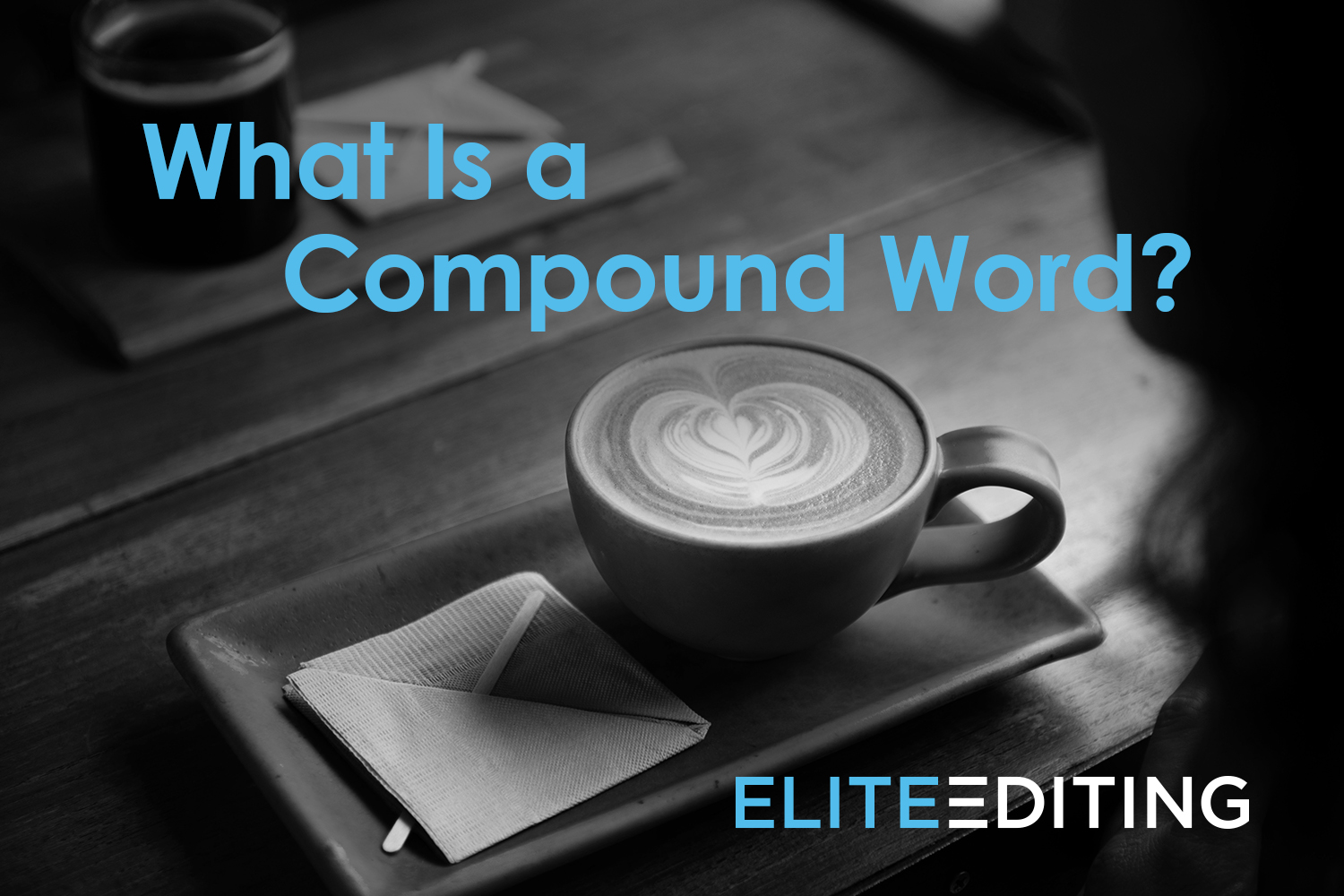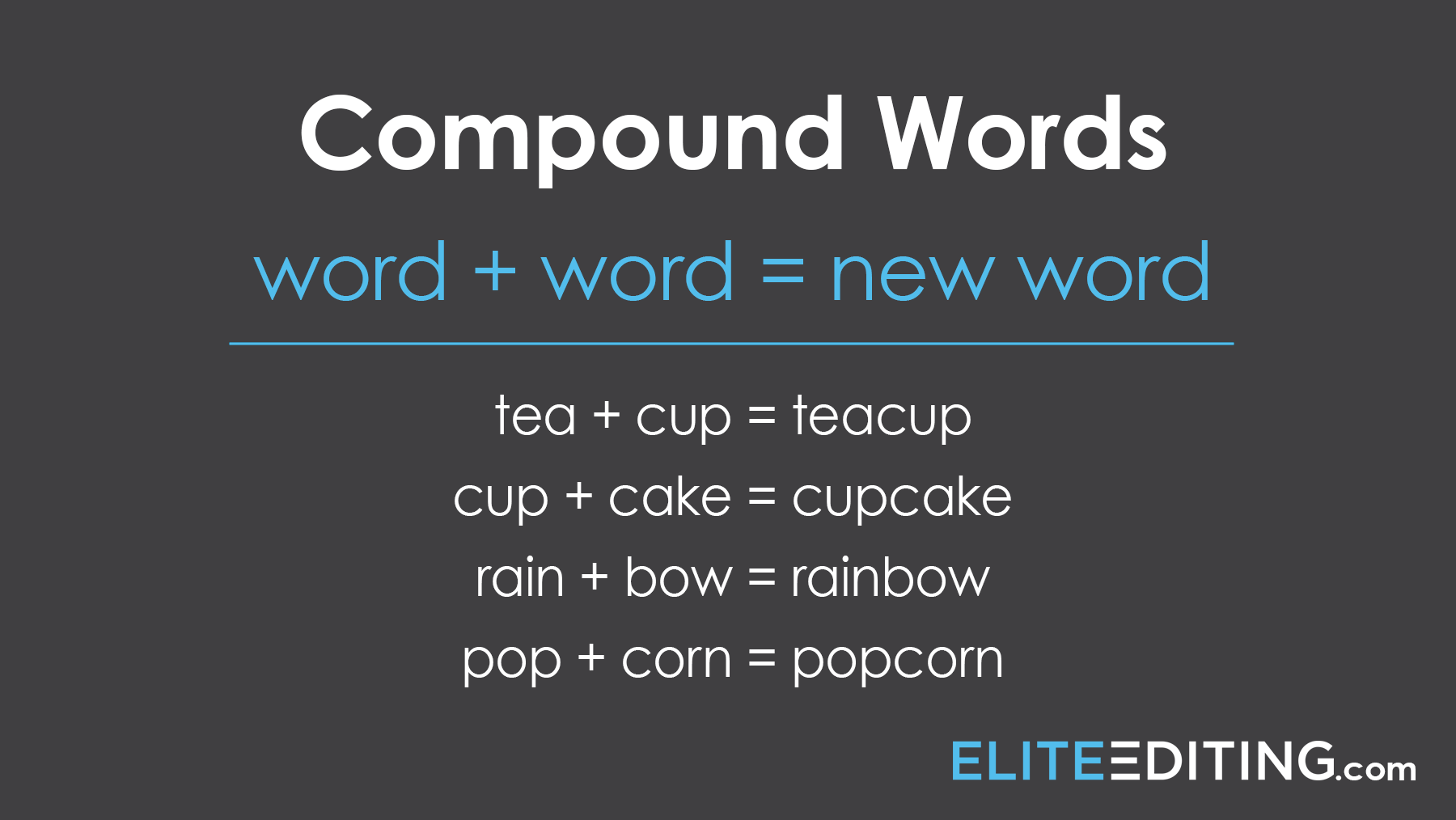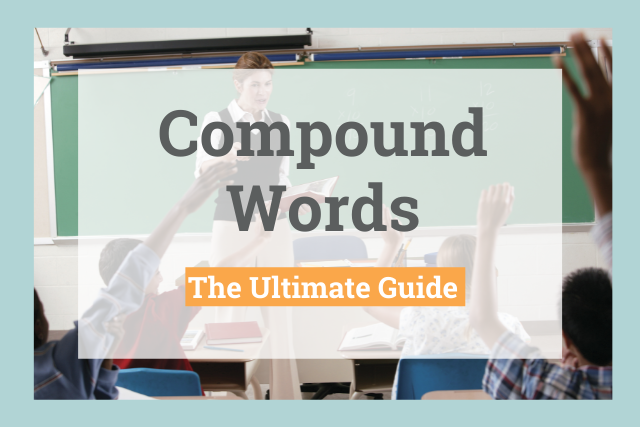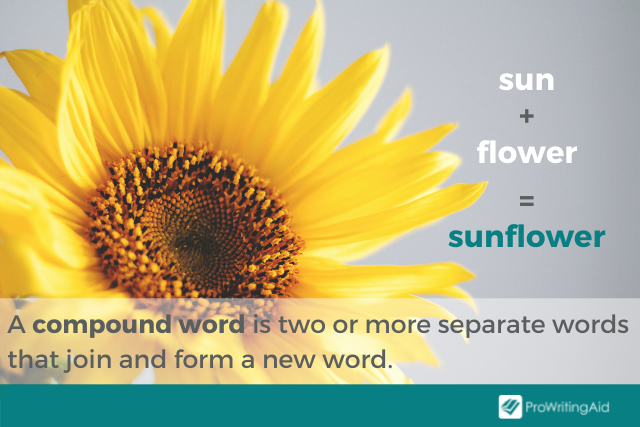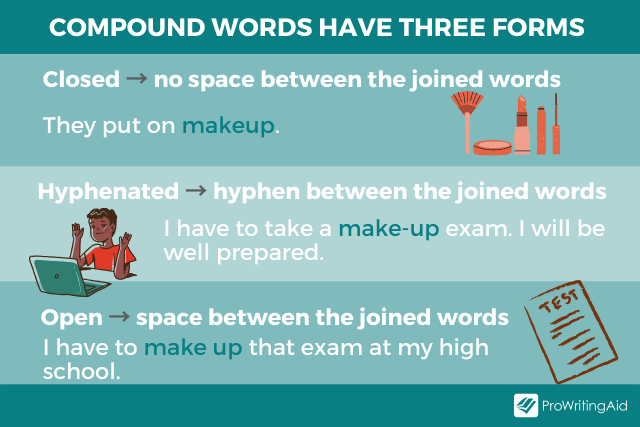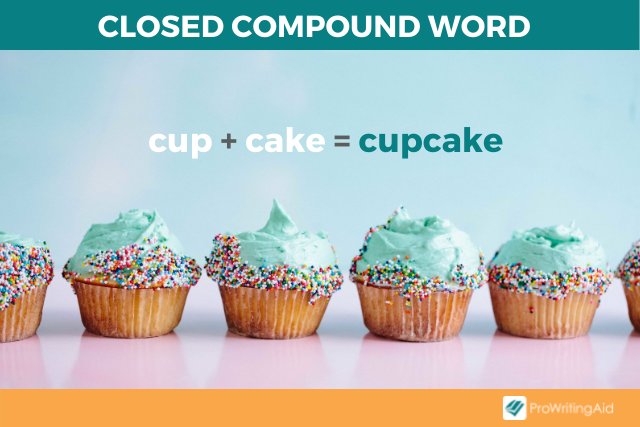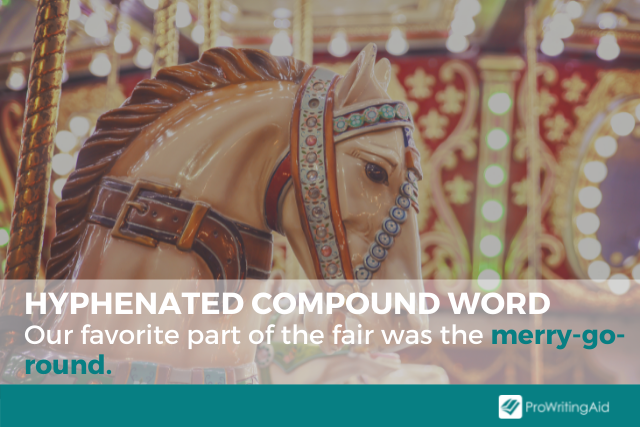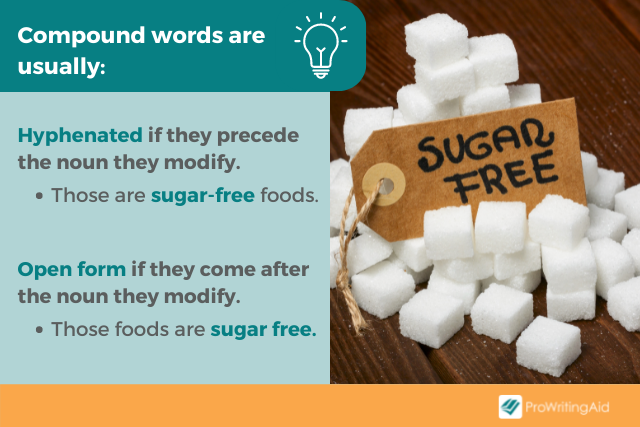Scientists are big into molecular compounds, and there is something kind of magical about them. You can start with a couple of atoms of hydrogen, add another atom of oxygen, and bada bing: water. Two distinct elements come together to create something entirely different.
It’s exactly the same with words. Well, maybe not exactly the same, but English is such a flexible, creative language that it’s filled with compound words—and new ones are popping up all the time to suit our ever-changing world. Some useful compound words recently added to Merriam-Webster are clickbait, photobomb, binge-watch, humblebrag, and spit-take.
So what is a compound word? How do you know whether it should be a closed compound, a hyphenated compound, or an open compound? What about compound sentences? We’ll look at all of these in this post.
When two (or occasionally, three) words work together to express a single idea, that’s a compound word. Compound words can be open, closed, or hyphenated, and they can function as nouns, adjectives, or adverbs. English is full of preexisting compound words—or you can make up your own to suit the situation.
No one at the Star Trek convention really appreciated my Klingon-librarian costume.
The lung-collapsing dead-flower stench of my aunt Penelope’s perfume was headache-inducingly strong.
What is an open compound word?
An open compound word is two separate words (without even a hyphen to link them) functioning as a single idea.
When we were in high school, we regularly ate French fries, hot dogs, and ice cream with peanut butter as an afterschool snack.
What is a hyphenated compound word?
A hyphenated compound word is a term composed of two (or more) words connected by a hyphen. Like other compound words, a hyphenated compound can be a noun, adjective, or adverb.
The gun-toting, card-carrying FBI agent hid her angst well.
What is a closed compound word?
A closed compound word is a single word constructed of two or more other words. Most closed compound words were once open or hyphenated, but continued use solidified them—made them a single unit. Today’s open or hyphenated compounds are tomorrow’s closed compounds.
The moonlight coming through my bedroom window is so bright it outshines my flashlight.
Every afternoon, she wrote another story in her notebook; my favorite is the one about the starfish who loved rainbows and strawberries.
How do you know whether a compound word is open, hyphenated, or closed?
There’s really no trick to this! You look it up in a dictionary (like Merriam-Webster). Compound words evolve over time, so what was once black-bird is now blackbird, and what was once a web site is now almost always a website.
Don’t worry if you find dictionaries contradicting each other! Not every dictionary agrees on which compounds are open, hyphenated, or closed. Some offer health care and voice mail, for example, as two words, but others hyphenate or close those same compounds. In such cases, you’re free to use the spelling you prefer, except if you’re supposed to be following a particular style guide.
For example, the Chicago Manual of Style (CMoS) says that when a compound modifier comes before a noun, it’s never wrong to hyphenate it, since it can aid readability.
The seventy-year-old professor despaired for the dull-witted students in her late-afternoon class.
But (Chicago goes on to say) when compound modifiers follow the noun, leave them unhyphenated (even if they’re hyphenated in the dictionary).
The professor, who was almost seventy years old, couldn’t understand why her students were so dull witted by late afternoon.
What is a compound noun?
Compound words can be nouns, adjectives, adverbs—and even verbs (like pole-vault or double-click). In each case, they can be open, hyphenated, or closed. Compound nouns are perhaps the most common type of compound word. Here are some examples of compound nouns (some closed, some open, some hyphenated).
Susan’s grandmother, my mother-in-law, had a skylight above the bookcase in her living room that let in rainwater.
Watch out for the sometimes-unusual plurals of hyphenated compound nouns.
The workmen fixing the two merry-go-rounds in the local park typically catcalled all passersby, but they stopped once our attorneys-at-law sent them a warning.
What is a compound name?
A compound name is essentially a compound proper noun—a multiword term (often an open compound, though not always) that names a single entity.
Like Popeye, Black Panther gets at least some of his powers from eating his greens—in his case, the heart-shaped herb. But I bet Superman liked Cheez-Its better.
What’s important here is that these proper nouns are always preexisting compounds, so if you’re turning an open compound name into part of a compound modifier (see more about compound adjectives and adverbs below), you’ll need to use an en dash rather than a hyphen.
My new World War I–era cloche didn’t really go with anything in my New York–style wardrobe, so naturally I had to go shopping.
What is a compound adjective?
A compound adjective is a single adjective made up of more than one word—and it’s often a compound noun (or even compound name) being used to modify another noun. According to CMoS, it’s never wrong to hyphenate multiword adjectives when they precede a noun, even if they’re familiar open compounds like high school.
High-school students often have more brain-draining homework than college students.
My silly-voiced sister found her calling in advertising.
When a compound name functions as an adjective, there’s no need for a hyphen.
Penny was thrilled to win Dolly Parton tickets.
The Los Angeles weather is typically hot and sunny.
As touched on above, when a compound adjective follows a noun, the hyphen is usually not necessary.
Georgia is a well-read academic.
Georgia is well read.
I found a useful list of low-calorie cocktails.
I found a useful list of cocktails, all of them low calorie.
Remember that compound adjectives made from an adverb ending in –ly plus an adjective are never hyphenated. The -ly is enough of a signal that what follows is meant to be read together with the preceding word.
Sarah’s short-tempered grandfather griped about her recital, calling it a really dull concert.
Sarah’s grandfather, always short tempered, griped about her recital, describing it as really dull.
What is a compound adverb?
A compound adverb looks like a single word but (closely examined) is actually made up of two or more words working together to function as a single adverb. They’re often rather old fashioned, and they can sound stuffy and pompous so are best used sparingly: notwithstanding, nevertheless, heretofore, albeit, and so on.
Phrasal adverbs are very similar to compound adverbs, and they’re rather more useful.
I scattered rose petals here and there.
The newly married couple walked arm in arm.
Joseph goes running every day.
What is a compound sentence?
And here’s the bonus section (because the last thing we want to do is compound anyone’s confusion about compounds)!
Compound sentences are grammatically unrelated to compound words, but that still doesn’t answer the key question: What is a compound sentence? A compound sentence is when two or more independent clauses, each with its own subject and verb plus attendant objects and phrases, are joined with a coordinating conjunction (one of the FANBOYS: for, and, nor but, or, yet, so). Here, the key thing to remember is to always include a comma after the first independent clause and before the conjunction.
I read this blog post about compound words, but they didn’t explain about compound sentences, so I had to keep on searching.
My son’s story about the strawberry-loving starfish was really cute, so I sent it to my sister, and she loved it too.
The words pancake, living room, and merry-go-round have something in common.
They are all examples of compound words.
The noun compound means something made up of two or more separate components. Compound can also be an adjective meaning consisting of two or more parts or components.
A compound word is one word, or one unit of meaning, that is created by joining two or more separate words together.
What Are Compound Words?
A compound word is a word made up of usually two but sometimes more words that are joined together. The two (or more) that make the compound word are independent words; they have their own distinct meanings. When those words are joined and form a compound word, that compound word has its own new meaning.
The Three Types of Compound Words
Compound words can take three possible forms: closed, open, or hyphenated. In closed form, there is no space between the joined words. In open form, there is a space between the “joined” words that still act as one unit, and in hyphenated form—you guessed it! There is a hyphen between the joined words.
These general “rules”—which are somewhat fluid and flexible—provide guidance as to what format a compound word takes.
-
Closed compound words are usually nouns: They put on makeup.
-
Open compound words are usually nouns or verbs: I have to make up (verb) that exam at my high school. (noun)
-
Hyphenated compound words are usually adjectives or adverb-adjective combinations: I have to take a make-up (adjective) exam. I will be well-prepared. (adverb + adjective)
The key word in each of those examples is “usually.” Some compound words break the rules. We’ll see how soon.
1. Closed Compound Words
To review: closed compound words are usually made up of two separate words that are put together to form a new word. There is no space between the two words in a closed-form compound word; the compound appears as one single word.
Examples of Closed Compound Words
-
Cup + cake becomes cupcake
-
Basket + ball becomes basketball
-
Key + board becomes keyboard
-
Extra + ordinary becomes extraordinary
-
Birth + day becomes birthday
You can see through these examples that the meaning of the compound word is not just a merger of the independent definitions of the individual words that join together to make that compound.
However, there is a relationship between the individual word meanings and the compounds. Compound words have been integrated into language as speakers have discovered those relationships. It makes perfect sense to call a cake that could fit into a cup a cupcake and to call a ball thrown through a basket (now a hoop) a basketball.
The rules for compound words, listed earlier in the post, include the word usually. That word means the rules are not hard and fast, and there are examples of compound words that break those rules.
For example, compound words that are verbs are usually open form, but here are rule-breaking closed-form compound verbs that remind us to hold those rules loosely:
-
I need to proofread my essay.
-
I think the clerk shortchanged me.
-
I have to babysit my little sister.
2. Open Compound Words
In an open compound word, there is a space between the two independent words, though they are still treated as one unit with a new “compound meaning.”
Examples of Open Compound Words
-
Living room: as a unit, this compound noun refers to a room in a house.
-
High school: as a unit, this compound noun refers to a school that has students in grades 9-12.
-
Post office: as a unit, this compound refers to a building where mail is collected, sorted, and sent.
-
Give up: as a unit, this compound verb means to stop trying.
-
Ask for: as a unit, this compound verb means to request something.
3. Hyphenated Compound Words
Hyphenated compound words have hyphens between each of the independent words that serve as connectors. The hyphens are a visual cue that the words form one unit.
Some compound words are always hyphenated.
-
Merry-go-round
-
Mother-in-law (and brother-, sister-, and father-in-law)
-
Self-esteem
Did you notice that all of those examples are nouns? Remember: the rules are flexible!
Examples of Hyphenated Compound Adjectives:
When compound words are used as adjectives (officially known as compound adjectives), the hyphenation rules change depending on where the compound adjective comes in the sentences.
If the compound adjective comes before the noun it modifies (describes), you should usually add a hyphen:
-
High-speed chase
-
Part-time employee
-
Full-time job
-
Fire-resistant pajamas
-
Good-looking person
-
Well-respected politician
-
Up-to-date records
Of course, there are exceptions. Remember, those “rules” are flexible. Some compound adjectives that precede the nouns they modify never take a hyphen. For example, ice cream and high school:
- High school students
- Ice cream sundae
There’s really no “why” to explain these exceptions; we’ve just adopted these forms and made them part of our language.
Examples of Open-Form Compound Adjectives
If the compound adjective comes after the noun it modifies, the hyphen is usually omitted.
-
Make sure the files are up to date. “Up to date” modifies, but comes after, the noun “files.”
-
The cat is two years old. “Two years old” modifies, but comes after, the noun “cat.”
Though post-noun modifiers don’t technically take hyphens, according to Merriam-Webster, usage trends indicate the hyphens are often included anyway, if the compounds “continue to function as unit modifiers.” So there’s that flexibility again.
What About Adverb Compounds?
It’s easy to find examples of closed, open, and hyphenated adverbs.
As for the closed-form examples, we probably don’t even register them as compound words much of the time.
-
Sometimes
-
Thereafter
-
Somewhere
Open-form adverbs occur when the adverb is the first word in the compound and ends in —ly. You should not hyphenate after an —ly adverb.
-
We made the discovery early on.
-
Her opinion is highly regarded.
-
They entered the dimly lit room.
What to Do If You’re Not Sure Which Form Is Right
While those flexible rules can help you, there may still be times when you feel confused about which compound form to use. Don’t stress too much.
According to Merriam Webster, the rules are more like patterns. You may see differences in different publications depending on editorial choice and style. For example, I looked on Amazon for a teapot. I saw mostly teapots, but also a few tea pots. Out of curiosity I put “tea pot” into a New York Times search bar, and found articles from the 1800s that included “tea-pot” in the title!
While interesting, those stylistic changes and choices shouldn’t be too surprising. Language is fluid and ever-evolving. Compound words themselves are proof of that evolution.
Keep Clarity the Focus
The purpose of hyphens in compound words is to ensure clarity. For example,
-
I bought over-the-counter medication.
-
He passed the medicine over the counter.
In the first example, I know by the hyphen that the medicine «I» bought did not require a prescription. «Over-the-counter» is one unit—one compound—describing a type of medicine.
In the second example, «over the counter» is serving another purpose and, while the words form a phrase to tell me where «he» passed the medicine, hyphens do nothing to make the purpose of the phrase clear and are therefore unnecessary.
Now look at these examples:
- He owned a little-used car.
- He owned a little used car.
In the first example, I know the man owns a car that has not been driven much. The car is described by the compound modifier «little-used.»
In the second example, it seems that the man owns a used car that is also small, or little. In this example, putting a comma after «little» would help to separate the two words, «little» and «used,» and show that they aren’t intended to work as a compound.
ProWritingAid Can Help
Though you’re a compound-word expert now, if you find yourself with lingering doubts, remember that ProWritingAid is here to help. It will let you know if you’ve added an unnecessary hyphen after an -ly adverb, or if you’ve left one out of a pre-noun compound adjective. You don’t have to write alone!
Take your writing to the next level:
20 Editing Tips from Professional Writers
Whether you are writing a novel, essay, article, or email, good writing is an essential part of communicating your ideas.
This guide contains the 20 most important writing tips and techniques from a wide range of professional writers.
There are various classes of words in the English Language ranging from nouns to prepositions. All these have been discussed in the post, Parts of Speech. However, some words are regarded as compound words. This post gives 1000 Compound Words Examples out of the several thousands of examples of compound words in English.
There is no end to how many compound words there are in English; but with these 1000 Compound Words Examples in English, though not exhaustive, you can research further on other compound words not captured here or, probably, generate your own.
Before I list the 1000 Compounds Word Examples in English, it would be great to describe compound words. The question then comes: what is a compound word? Let us proffer an answer to this important question…
What is a Compound Word?
Compound words in English are usually formed when we join two or more words together. In other, words, a compound word is the combination of two or more free morphemes to form a new word.
Compounding: A Word Formation Process
This takes us to the concept of Compounding, which is one of the word formation processes in English. Compounding takes place when two or more free morphemes that can stand severally on their own are brought together to create a new word. It could happen that the meaning of a compound word could be related to or different from the meaning or connotation it its constituent parts when considered severally.
Types of Compound Words
There are three types of compound words and these include: closed compound words, hyphenated compound words and open compound words. See more…
Closed Compound Words
In the closed compound words, the words involved are combined together. Closed compound words, most likely, are usually monosyllabic units already established in the language for a long time. Examples include: flowerpot, keyboard, notebook, bookstore, basketball, etc.
Hyphenated Compound Words
For the hyphenated compound words, a hyphen is used to join the words involved; for example: mother-in-law, merry-go-round, off-the-cuff, etc. The use of a hyphen in this instance helps to prevent ambiguity.
Open Compound Words
In the open compound words, there is a space between the compound words that are written together such as school bus, living room, carbon dioxide, snow white, blood red, etc.
What Determines Types of Compound Words
What determines if a compound word is classified as closed, hyphenated or open could depends on whether we use it as a noun, adjective or verb.
Verbs are usually open. For example:
- You must always back up the files on your computer.
- It is not good for students to carry over their courses
- Police usually follow up on a new lead.
Adjectives and nouns are usually closed or hyphenated. For instance:
- You can access backup copies of your files in case of any eventuality.
- The students had many carryovers in their courses.
- The police had already worked on the follow-up lead.
Adjective–adjective compounds, as well as, verb–verb compounds, such as blue-green and freeze-dried, are often hyphenated. Compounds that contain articles, prepositions or conjunctions, such as rent-a-cop, mother-of-pearl and salt-and-pepper, salt-and-sugar, hard-and-fast, etc. are also often hyphenated.
Longer words usually fall under the category of open compound words such as distance learning, player piano, lawn tennis, etc.
It is important to note that usage or forms of compound words in American English and British English Usage varies and is usually contingent on the individual choice of the writer rather than on a hard-and-fast rule; therefore, it is possible to encounter closed, hyphenated, and open forms for the same compound noun, such as the trio of:
- Container ship, container-ship or containership
- Particle board, particle-board or Particleboard.
Classifications of Compound Words
The constituent words in a compound word can be classified based on their Word Classes or Parts of Speech. We can call this type of classification a Syntactic Classification. The constituent words may be from similar Part of Speech or may be of different parts of speech. Let us see some examples:
Noun-Noun
This is an instance where both constituent words in the compound words are nouns. Examples include: airport, wallpaper, textbook, doorknob, waterbed, wastebasket, football, cufflinks, housewife, lawsuit, wallpaper, basketball, sodium chloride, classroom, workstation, tapeworm, crankshaft, etc.
Noun-Verb
The noun-verb compound word has a noun as the first constituent and a verb as the second constituent. For example: browbeat, sidestep, manhandle, safeguard, water borne, value-added, rocket-propelled, sunbathe, airlift, etc.
Noun-Adjective
The noun-adjective combination has a noun as the first constituent and an adjective as the second constituent. Examples include: snow white, world population, overcoat, trustworthy, blood red, handpicked, world famous, heartbroken, heart problem, prize worthy, lead strong, worldwide, lifelong, tax-free, sky blue, self-important, spoon-fed, praiseworthy, water-repellant, air-tight, bulletproof, etc.
Adjective-Noun
This is an instance where the first constituent word in the compound word is an adjective and the other one a noun. Examples include: blackboard, smartphone, whiteboard, badmouth, blue sky, red light, four wheel, full-time, long-term, etc.
Adjective-Verb
This instance is when the first constituent is an adjective while the second word in the compound word is a verb. Examples of this instance include: whitewash, blacklist, highlight, proofread, shortlist, etc.
Verb-Verb
In this instance, both constituents of the compound words are verbs. Examples include: typewrite, test-drive, freeze-dry, etc.
Verb-Noun
This is an instance where the first constituent word in the compound word is a verb and the other one a noun. Examples include: dreadnought, typewriter, breakfast, cutthroat, pickpocket, killjoy, spoilsport, know-nothing, breakwater, carrycot, etc.
Verb-Preposition
In this instance, we have a combination of a verb and a preposition forming the compound word respectively. Examples of this instance include: Roll off, roll on, stick on, walk on, stand by, walk through, see through, lay by, cut through, lookout, Work on, take down, take away, tear up, etc. Some of these examples also pass for Phrasal Verbs. You can take a look at the over 500 Phrasal Verbs discussed here.
Preposition-Noun
In this combination of compound words, we have a preposition coming first and followed by a noun. Examples of this combination include: overview, downsize, upgrade, underworld, oversight, undergraduate under-development, etc.
Preposition Noun (Phrase) Combinations
Examples of Preposition-Noun Phrase include: Off-the-record, over-the-counter, off-the-cuff, round-the-block, off-the-deep-end, off the hook, off the wall, off-your-head, off-your-own-bat, off-your-rocker, round-the-twist, round-the-corner, etc.
Preposition-Verb
This combination comprises a preposition and a verbs in the first and second constituents respectively. Examples include: overhang, counterattack, undercut, overpay, counterbalance, overrate, underlie, outrun, outvote, overreact, oversleep, overwork, undersell, undervalue, etc.
Other Combinations
There are other possible combinations like:
- Adjective-adjective (blue-green)
- Adverb-preposition (forthwith)
- Verb-adverb (tumbledown)
- Preposition-adjective (overripe, off-white)
- Verb-adverb (takeout)
- Preposition-adverb (without)
- Compound Adverbs (moreover, however, nonetheless, furthermore, meanwhile)
- Determiner-Noun Combinations or wh-forms (anyhow, somewhere, nowhere, sometimes, anytime)
You can attempt to fit the 1000 examples of compound words provided below into their appropriate combinations. I’m sure that should not be difficult for you to do.
It is also important to note that compound words in English, save for exceptions, are usually stressed on their first words.
1000 Compound Words Examples
It is really impossible to give an exhaustive list of all the compound words in English; especially, those that fall under the open class segment as there is no end to compound words that could be therein generated. But the list below contains 1000 Compound Words Examples in English. For emphasis, there are thousands of other examples. So, the list is not limited to what is provided below. Take a look…
1000 Compound Words Examples (A-D)
- Above-board
- Afterglow
- Afterimage
- Afterlife
- Afternoon
- Airbag
- Airbase
- Airborne
- Aircraft
- Airfield
- Airlift
- Airline
- Airmen
- Airplane
- Airport
- Airtight
- Airtime
- All-over
- Allspice
- Alongside
- Anybody
- Anyhow
- Anymore
- Anyone
- Anyplace
- Anytime
- Anyway
- Arm-twist
- Ashtray
- Baby bed
- Baby boom
- Baby boomers
- Baby carriage
- Baby-faced
- Babyhood
- Babyminder
- Babysit
- Babysitter
- Backache
- Backbeat
- Backbench
- Backbenchers
- Backbend
- Backbite
- Backblast
- Backbone
- Backbreaker
- Backdrop
- Backfire
- Background
- Backhand
- Backlash
- Backlog
- Backpack
- Backside
- Backslap
- Backslide
- Backspace
- Backspin
- Backstage
- Backstroke
- Backtrack
- Backward
- Ballpark
- Ballroom
- Bandwagon
- Bankbook
- Bankroll
- Baseball
- Basketball
- Beachcomb
- Bedclothes
- Bed lamp
- Bedrock
- Bedroll
- Bedroom
- bedspread
- Bellbottom
- Bellboy
- Bellhop
- Below
- Berrylike
- Billboard
- Billhook
- Bitterroot
- Bittersweet
- Bitterweed
- Bitterwood
- Blackball
- Blackberries
- Blackbird
- Blackboard
- Blackjack
- Blacklist
- Blackmail
- Blackout
- Blackpool
- Blacksmith
- Blacktop
- Blowgun
- Bluebell
- Blueberry
- Bluebird
- Bluefish
- Bluegrass
- Blueprint
- Boardwalk
- Body bag
- Body-boarding
- Body blow
- Bodybuilder
- Body hair
- Bodywork
- Bodyguard
- Bodywork
- Boldface
- Bookcase
- Bookend
- Bookkeeper
- Bookmark
- Bookmobile
- Bookseller
- Bookshelf
- Bookstore
- Bookworm
- Bootstrap
- Bowlegs
- Bowtie
- Brainchild
- Brainwash
- Brotherhood
- Brow beat
- Bugspray
- Butterball
- Buttercup
- Butterfingers
- Butterflies
- Buttermilk
- Butternut
- Butterscotch
- Bypass
- Cabdriver
- Candlelight
- Candlestick
- Candyfloss
- Candytuft
- Cardboard
- Cardsharp
- Cardstock
- Carefree
- Caretaker
- Careworn
- Carfare
- Cargo
- Carhop
- Carload
- Carpetbagger
- Carpool
- Carport
- Carrack
- Carryall
- Carsick
- Cartwheel
- Catchword
- Cattail
- Catwalk
- Caveman
- Centercut
- Cheeseburger
- Cheesecake
- Classmates
- Classroom
- Clockwise
- cocksure
- Coffeemaker
- Comeback
- Comedown
- Commonplace
- Commonwealth
- Cornmeal
- Counterattack
- Counterproductive
- Courthouse
- Courtyard
- Crewcut
- Crossbow
- Crossbreed
- Crosscut
- Crossover
- Crosswalk
- Dairymaid
- Daisywheel
- Daybed
- Daybook
- Daybreak
- Daydream
- Daylight
- Daytime
- Deadbeat
- Dead body
- Deadbolt
- Dead drop
- Dead-end
- Deadeye
- Deadfall
- Dead heat
- Dead letter
- Deadlight
- Deadline
- Dead load
- Deadlock
- Deadlocked
- Dead mail
- Dead march
- Dead metaphor
- Dickhead
- Dick test
- Dishcloth
- Dishpan
- Dishwasher
- Dishwater
- Diskdrive
- Dog-tired
- Dogwood
- Doorstop
- Double agent
- Double-barrelled
- Double-bedded
- Double bond
- Doublecross
1000 Compound Words Examples (D-N)
- Double-date
- Double-decker
- Downbeat
- Downcast
- Downcourt
- Downtime
- Downtown
- Downtrodden
- Downunder
- Drawbridge
- Driveway
- Duckbill
- Duckpin
- Duckweed
- Earache
- Eardrop
- Eardrum
- Earring
- Earthbound
- Earthquake
- Earthward
- Earthworm
- Egghead
- Eggshell
- Elsewhere
- Everything
- Extraordinary
- Eyeballs
- Eyebath
- Eyebeam
- Eye-catching
- Eyeglasses
- Eyelash
- Eyelid
- Eyesight
- Eyewitness
- Fatherhood
- Fatherland
- Firearm
- Fireball
- Fireboat
- Firebomb
- Firebreak
- Firecracker
- Firefighter
- Fireflies
- Firehouse
- Fireproof
- Firewater
- Fishbowl
- Fisherman
- Fisheye
- Fishhook
- Fishlike
- Fishmonger
- Fishnet
- Fishpond
- Fishtail
- Football
- Foothill
- Footlights
- Footlocker
- Footnote
- Footprint
- Footprints
- Footrest
- Footwear
- Forbearer
- Forbid
- Forebode
- Forearm
- Forebear
- Forebrain
- Forecast
- Forecastle
- Foreclose
- Foreclosure
- Foredoom
- Forefather
- Forefeet
- Forefinger
- Forefoot
- Forego
- Foregone
- Foreground
- Forehand
- Forehead
- Foreknowledge
- Foreleg
- Foreman
- Foremost
- Forepaws
- Foresee
- Foreshadow
- Foresight
- Forestall
- Forethought
- Foretell
- Foretold
- Forever
- Forewarn
- Foreword
- Forget
- Forgive
- Forklift
- Format
- Fortnight
- Friendship
- Fruitcup
- Gearshift
- Glassmaking
- Goodbye
- Goodnight
- Grandaunt
- Grandchild
- Grandchildren
- Granddaughter
- Grandfather
- Grandmaster
- Grandmother
- Grandnephew
- Grandnieces
- Grandparent
- Grandson
- Grandstand
- Granduncle
- Grasshopper
- Grassland
- Graveyard
- Gumball
- Haircut
- Hamburger
- Hammerhead
- Handbook
- Handcuff
- Handgun
- Handmade
- Handout
- Headache
- Headdress
- Headlight
- Headline
- Headquarters
- Heaven-sent
- Heavenward
- Helpdesk
- Helpline
- Helpmate
- Hereafter
- Hereby
- Herein
- Hereupon
- Herself
- Highball
- Highchair
- Highland
- Highway
- Himself
- Homemade
- Hometown
- Honeybee
- Honeybees
- Honeycomb
- Honeycreeper
- Honeydew
- Honeymoon
- Honeypot
- Honeysuckle
- Hookup
- Hookworm
- Horseback
- Horsefly
- Horsehair
- Horseman
- Horseplay
- Horsepower
- Horseradish
- hotbed
- hothead
- Houseboat
- Household
- Housekeeper
- Housetop
- Housework
- However
- Intake
- Interstate
- Ironwork
- Itself
- Jackpot
- Jailbait
- Jellybean
- Jellyfish
- Jetliner
- Jetport
- Jumpshot
- Jumpstart
- Keyboard
- Keyhole
- Keynote
- Keypad
- Keypunch
- Keystone
- Keystroke
- Keyway
- Keyword
- Lacklustre
- Lifeblood
- Lifeboat
- Lifebuoy
- Lifeguard
- Lifejacket
- Lifelike
- Lifeline
- Lifelong
- Lifesaver
- Lifestyle
- Lily-livered
- Lifetime
- Lifework
- Limelight
- Limestone
- Longhand
- Longhouse
- Lukewarm
- Mainland
- Mainline
- Matchbox
- Meantime
- Meanwhile
- Moneybag
- Moneylender
- Moonbeam
- Moonflower
- Moonlight
- Moonlit
- Moonscape
- Moonshine
- Moonstruck
- Moonwalk
- Moorfields
- Moorfowl
- Moorland
- Mopboard
- Moreover
- Mothball
- Motherhood
- Motorcycle
- Nearby
1000 Compound Words Examples (N-S)
- Nevermore
- Newborn
- Newfound
- Newsboy
- Newsbreak
- Newscaster
- Newsdealer
- Newsletter
- Newsman
- Newspaper
- Newsperson
- Newsprint
- Newsreel
- Newsroom
- Newsstand
- Newsworthy
- Nightfall
- Noisemaker
- Northeast
- Notebook
- Noteworthy
- Nowhere
- Nursemaid
- Nutcracker
- Offbeat
- Off-record
- Oilbird
- Oilcan
- Oilcloth
- Oilfield
- Oilman
- Oil-rich
- Oneself
- Onetime
- Outbalance
- Outbid
- Outboard
- Outdoor
- Outflank
- Outflow
- Outlive
- Outnumber
- Overabundance
- Overboard
- Overcoat
- Overflow
- Overland
- Overshoes
- Overview
- Pacemaker
- Pancake
- Passbook
- Passkey
- Passover
- Paycheck
- Peppermint
- Pickup
- Pinhole
- Pinstripe
- Pinup
- Pinwheel
- Pipe-borne
- Play-actor
- Playback
- Playbill
- Playbook
- Playboy
- Play day
- Play dough
- Playground
- Playhouse
- Playthings
- Ponytail
- Popcorn
- Postcard
- Poverty grass
- Poverty level
- Poverty line
- Poverty trap
- Poverty-stricken
- Priesthood
- Punchbag
- Punchboard
- Punchbowl
- Racquetball
- Railroad
- Railway
- Rainbow
- Raincheck
- Raincoat
- Raindrop
- Rainstorm
- Rainwater
- Rattlesnake
- Rattletrap
- Repairman
- Riverbanks
- Rollerblade
- Rollercoaster
- Roller-skating
- Rubberband
- Sailboat
- Salesclerk
- Sand dune
- Sandlot
- Sandstone
- Saucepan
- Scapegoat
- Scarecrow
- Schoolbook
- Schoolboy
- Schoolbus
- Schoolhouse
- Schoolwork
- Seaport
- Seashore
- Setback
- Shadyside
- Sharecropper
- Sharpshooter
- Sheepskin
- Shipbottom
- Shoelace
- Shoemaker
- Shortbread
- Showoff
- Showplace
- Sideburns
- Sidekick
- Sideline
- Sideshow
- Sidestep
- Sidetrack
- Sidewalk
- Silver age
- Silver ash
- Silver beech
- Silver bell
- Silver berry
- Silver-blue
- Silver-bodied
- Silver bromide
- Silver-bush
- Silver cord
- Silver dollar
- Silver fern
- Silver fir
- Silverfish
- Silver grass
- Silver-gray
- Silver-green
- Silver-haired
- Silversmith
- Sisterhood
- Sixfold
- Skateboard
- Skintight
- Skylark
- Skylight
- Skyscraper
- Slapstick
- Slowdown
- Slumlord
- Smartphone
- Snakeskin
- Snowball
- Snowbank
- Snowbird
- Snowboard
- Snowdrift
- Snowfall
- Snowflakes
- Snowshovel
- Softball
- Software
- Somebody
- Someday
- Somehow
- Someone
- Someplace
- Something
- Sometimes
- Somewhat
- Somewhere
- Soulmate
- Soundproof
- Southeast
- Southwest
- Soybean
- Spacewalk
- Spearmint
- Spillway
- Spokesperson
- Stagehand
- Stage-manage
- Standby
- Standoff
- Standout
- Standpipe
- Standpoint
- Starfish
- Steamboat
- Steamship
- Stepson
- Stockroom
- Stonewall
- Stoplight
- Stopwatch
- Storerooms
- Stronghold
- Subway
- Sunbaked
- Sunbathe
- Sunbeams
- Sunbelt
- Sunberry
- Sunblock
- Sunburn
- Sunday
- Sundial
- Sundown
- Sunfish
- Sunflower
- Sunglasses
- Sunlit
- Sunrays
- Sunroof
- Sunup
- Supercargo
- Supercharge
1000 Compound Words Examples (S-W)
- Supercool
- Superego
- Superfine
- Supergiant
- Superhero
- Superhighways
- Superhuman
- Superimpose
- Superman
- Supermarket
- Supermen
- Supernatural
- Superpower
- Superscript
- Supersensitive
- Supersonic
- Superstar
- Superstrong
- Superstructure
- Supertanker
- Superweapon
- Superwoman
- Sweetheart
- Sweetmeat
- Swift-footed
- Swordfish
- Tablecloth
- Tablespoon
- Tabletop
- Tableware
- Tadpole
- Tagalong
- Tailbone
- Tailcoat
- Tailgate
- Taillight
- Taillike
- Tailpiece
- Tailspin
- Takeoff
- Takeout
- Takeover
- Talebearer
- Taleteller
- Tapeworm
- Taproom
- Taproot
- Taskmaster
- Taxicab
- Taxpayer
- Teacup
- Teammate
- Teamwork
- Teapot
- Teaspoon
- Teenager
- Telltale
- Tenderfoot
- Tenfold
- Textbook
- Themselves
- Therefore
- Throwaway
- Throwback
- Thunderbird
- Thunderbolt
- Thunderclap
- Thundercloud
- Thunderflash
- Thunderhead
- Thundershower
- Thunderstorm
- Thunderstruck
- Timekeeper
- Timepieces
- Timesaver
- Timesaving
- Timeshare
- Timetable
- Tonguefish
- Tongue-lash
- Toolbox
- Toothpaste
- Toothpick
- Touchdown
- Township
- Turnabout
- Turnaround
- Turnbuckle
- Turncoat
- Turndown
- Turnkey
- Turnoff
- Turntable
- Typewrite
- Typewriter
- Underachieve
- Underact
- Underage
- Underarm
- Underbelly
- Underbid
- Undercharge
- Underclothes
- Undercover
- Undercurrent
- Undercut
- Underdevelop
- Underdog
- Underestimate
- Underexpose
- Underfoot
- Underground
- Upbeat
- Upbringing
- Upcoming
- Upcourt
- Update
- Upend
- Upgrade
- Upheaval
- Upheld
- Uphill
- Uphold
- Upkeep
- Upland
- Uplift
- Uplink
- Upload
- Upmarket
- Uppercase
- Upperclassman
- Uppercut
- Uppermost
- Upright
- Uprising
- Uproar
- Uproot
- Upscale
- Upset
- Upshot
- Upside
- Upstage
- Upstairs
- Upstanding
- Upstart
- Upstate
- Upstream
- Upstroke
- Uptake
- Upthrust
- Uptight
- Uptime
- Uptown
- Upturn
- Upward
- Upwind
- Vainglory
- Viewpoint
- Vineyard
- Violin cello
- Volleyball
- Voltmeter
- Vouchsafe
- Waistline
- Walkways
- Walleyed
- Wallpaper
- Wardroom
- Warehouse
- War advocacy
- War baby
- War bride
- War chest
- War cloud
- War correspondent
- War crime
- War criminal
- War cry
- Warfare
- Warlike
- Warmonger
- Warmblooded
- Warpath
- Washboard
- Washbowl
- Washcloth
- Washhouse
- Washout
- Washrag
- Washroom
- Washstand
- Washtub
- Wastebag
- Wastebasket
- Wastebin
- Wasteland
- Wastepaper
- Wastewater
- Watchband
- Watchdog
- Watchmaker
- Watchman
- Watchtower
- Watchword
- Waterbed
- Water beetle
- Water birch
- Waterbird
- Water biscuit
- Waterboarding
- Water boatman
- Waterborne
- Waterbottle
- Water boy
- Water buck
- Water buffalo
- Water bug
- Watercolour
- Watercooler
- Watercourse
- Watercraft
- Waterfall
- Waterfowl
- Waterfront
- Waterline
- Waterlog
1000 Compound Words Examples (W-Z)
- Watermark
- Watermelon
- Waterpower
- Waterproof
- Waterscape
- Watershed
- Waterside
- Waterspout
- Watertight
- Waterway
- Waterwheel
- Waterworks
- Wavelength
- Wavelike
- Waxwork
- Waybill
- Wayfarer
- Waylaid
- Wayside
- Wayward
- Weathercock
- Weatherman
- Weatherproof
- Weekday
- Weekend
- Weeknight
- Wetland
- Whatever
- Whatsoever
- Wheelbarrow
- Wheelbase
- Wheelchair
- Wheelhouse
- Wheelhouse
- Whereabouts
- Whipcord
- Whip hand
- Whiplash
- Whiplike
- Whipsaw
- Whip snake
- Whipstitch
- Whipstock
- Whiptail
- Whip through
- Whip top
- Whiteboard
- Whitecap
- Whitefish
- Whitehall
- Whitehead
- Whitewall
- Whitewash
- Widespread
- Wipeout
- Wisplike
- Without
- Wood ant
- Woodblock
- Woodborer
- Wood-burning
- Woodcarver
- Woodcarving
- Woodchip
- Wood coal
- Woodcock
- Woodcraft
- Wood-creeper
- Woodcutter
- Wood duck
- Woodshop
- Yachtsman
- Yachtsman
- Yachtsmen
- Yachtsmen
- Yard bird
- Yard birds
- Yard land
- Yard lands
- Yard wand
- Yard wands
- Yard work
- Yard works
- Yardarms
- Yardman
- Yardmaster
- Yardmasters
- Yardstick
- Yardsticks
- Yearbook
- Yearbooks
- Yearlong
- Yellow fin
- Yellow fins
- Yellow ware
- Yellow wares
- Yellowhammer
- Yellowhammers
- Yellowlegs
- Yellowtail
- Yellowtails
- Yellowthroat
- Yellowthroats
- Yellowwood
- Yellowwoods
- Yokefellow
- Yokefellows
- Yokemate
- Yokemates
- Youngberries
- Youngberry
- Youth quake
- Zoo technical
- Zoogeographer
- Zoogeographers
- Zoogeographies
- Zoogeography
- Zookeeper
- Zoosperms
- Zootechnics
Closing Words and Related Posts
It is possible that some of these 1000 Compound Words Examples could be written differently in other instances where they appear; but remember that this also depends on the choice of the writer to select any of the three types of compound words that we have. However, there are some of these compound words that have to be written based on acceptable convention. You can check out other related posts as listed below:
9 Types of Nouns with Examples
10 Examples of Complex Sentences
100 Examples of Synonym Words
100 Examples of Compound Sentences in English
25 Examples of Complex Sentences
50 Examples of Simple Sentences
How do you decide whether a compound should be written as one word, separate words, or hyphenated words?
Compounds
A compound is a word or word group that consists of two or more parts that work together as a unit to express a
specific concept. Compounds can be formed by combining two or more words (as in double–check,
cost–effective, farmhouse, graphic equalizers, park bench, around–the–clock, or son of a gun), by combining prefixes or suffixes with words (as in ex–president, shoeless, presorted, or uninterruptedly), or by combining two or more word elements (as in macrophage or photochromism). Compounds are written in one of three ways: solid (as in cottonmouth), hyphenated (screenwriter–director), or open (health care). Because of the variety of standard practice, the choice among the styles for a given compound represents one of the most common and vexing of all style issues writers encounter.
Compounds in the Dictionary
A good dictionary will list many permanent compounds, compounds so commonly used that they have become
permanent parts of the language. However, a dictionary generally will not list temporary compounds, those
created to meet a writer’s need at a particular moment. Most compounds whose meanings are self–evident from the
meanings of their component words also will not be listed in the dictionary, even if they are permanent and
widely used.
The Compound–styling Conundrum
When compounds begin to be used widely, there may be significant variation in how writers style them, and it can
take years to achieve a high degree of consistency in their format. For many terms, it is often completely acceptable
to choose freely among open, hyphenated, and closed alternatives, even though the term has been used in English for
an extended period (for instance, lifestyle, life–style, or life style). Although the
styling that ultimately takes hold for a compound may be determined by nothing more than editorial preference, there
is one pattern that often holds true as new compounds become entrenched in English. Compound nouns are usually written
as one word, compound verbs are generally written as two, and compound adjectives are very often written with a
hyphen.
Styling Internet– and Computer–Related Terms (e.g., on–line, website, e–mail)
Internet–related compounds are still so new that their preferred styling remains in flux, with the same compound
styled different ways in different publications. Over time, they will likely become more consistent, but what should
writers do now? The following list provides the Internet–term stylings that are currently most widely used in
professionally edited, published writing.
- E–mail (with a capital E when used as a noun)
- e–mail (with a lowercase e when used as a verb)
- online
- Web site
- Web page
- e–book
- e–tail
- webcam
- webcast/webcaster
- webmaster (often cap)
- dot–com
Text for this article was adapted from Merriam-Webster’s Manual for Writers and Editors.

